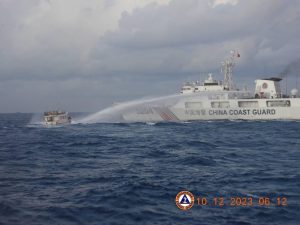Foreign ministers of the Association of Southeast Asian Nations (ASEAN) have belatedly registered their concern over the ongoing tensions in the South China Sea, at the tail end of a year that has seen numerous confrontations between Chinese and Philippine vessels.
In a statement issued on Saturday, the second to last day of 2023, the bloc’s top diplomats said that the growing friction could threaten regional peace, urging the rival claimants to engage in peaceful dialogue.
“We closely follow with concern the recent developments in the South China Sea that may undermine peace, security, and stability in the region,” the statement read. “We reaffirm our unity and solidarity and our shared commitment to maintaining and further strengthening stability in our maritime sphere to bring about overall peace, security, stability, and prosperity in our region.”
2023 was a year of growing confrontation in the contested and economically vital waterway, as China took steps to assert its expansive “nine-dash line,” which lays claim to nearly the entire South China Sea and overlaps with those of five ASEAN member states: Vietnam, Malaysia, the Philippines, Brunei, and Indonesia.
The most pugnacious Chinese actions took place in waters claimed by the Philippines, particularly around Second Thomas Shoal, a submerged feature that the Philippines occupies in the Spratly Islands. Since early last year, China has taken increasingly aggressive steps to prevent Philippine forces from resupplying the small detachment of troops stationed aboard the BRP Sierra Madre, a rusting warship that was purposefully grounded on the shoal in 1999. Chinese vessels have collided with Philippine supply boats and coast guard ships and deployed high-pressured water cannons and even a military-grade laser to stymie the resupply missions.
The confrontations at sea have brought Philippines-China relations to their worst point since the administration of President Benigno Aquino III, with the two nations trading recriminations and accusations of responsibility during the closing weeks of 2023. Last month, Chinese Foreign Minister Wang Yi warned that bilateral relations were “at a crossroads.”
In their statement, the first standalone statement that ASEAN has issued on the South China Sea, the bloc’s foreign ministers also reaffirmed the need to “exercise self-restraint in the conduct of activities that would complicate or escalate disputes.” They also “reiterate[d] the importance of peaceful dialogue that contributes constructively to the promotion of regional stability and cooperation in the maritime domain.”
Throughout the recent tensions, many observers have questioned why ASEAN has failed to speak out about the Chinese action. The obvious answer is that the bloc has been hamstrung by its policy of consensus decision-making, given that not all of its member states have a direct stake in the disputes, and that some have close relations with China and are reluctant to speak out against its actions.
As such, it is unsurprising that the belated statement does not advance beyond the lowest-common-denominator statements that have been issued during ASEAN’s regular summits and foreign minister conclaves, in which China is not mentioned as the primary antagonist.
That said, the statement is not without its significance.
As Evan Laksmana of the International Institute for Strategic Studies wrote on the social media platform X (formerly Twitter), there are few steps that ASEAN could take that would get China to cease its belligerent actions in contested waters. Seen in this light, the issuing of a standalone statement was “a good first step” in building solidarity and keeping the fragile notion of “ASEAN unity” intact, after years in which it has been undermined by intra-bloc divisions over the South China Sea.
Laksmana argued that it should be the first step toward more effectively institutionalizing regional maritime security cooperation. While ASEAN’s skeptics will continue to have ample grounds to suspect the bloc’s ability to handle the challenge posed by China’s coast guard, he concluded that the foreign ministers’ statement was “a necessary but far from sufficient step on behalf of the group in response to recurring maritime incidents.”
If turbulent 2023 was any indication, ASEAN will be tested by further incidents in the year to come.

































